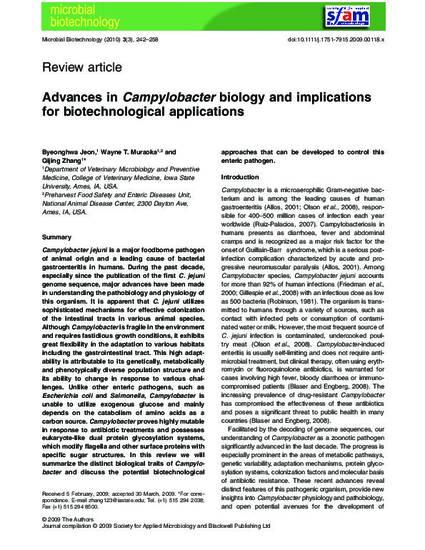
Article
Advances in Campylobacter biology and implications for biotechnological applications
Microbial Biotechnology
Document Type
Article
Disciplines
Publication Version
Published Version
Publication Date
5-1-2010
DOI
10.1111/j.1751-7915.2009.00118.x
Abstract
Campylobacter jejuni is a major foodborne pathogen of animal origin and a leading cause of bacterial gastroenteritis in humans. During the past decade, especially since the publication of the first C. jejuni genome sequence, major advances have been made in understanding the pathobiology and physiology of this organism. It is apparent that C. jejuni utilizes sophisticated mechanisms for effective colonization of the intestinal tracts in various animal species. Although Campylobacter is fragile in the environment and requires fastidious growth conditions, it exhibits great flexibility in the adaptation to various habitats including the gastrointestinal tract. This high adaptability is attributable to its genetically, metabolically and phenotypically diverse population structure and its ability to change in response to various challenges. Unlike other enteric pathogens, such as Escherichia coli and Salmonella, Campylobacter is unable to utilize exogenous glucose and mainly depends on the catabolism of amino acids as a carbon source. Campylobacter proves highly mutable in response to antibiotic treatments and possesses eukaryote-like dual protein glycosylation systems, which modify flagella and other surface proteins with specific sugar structures. In this review we will summarize the distinct biological traits of Campylobacter and discuss the potential biotechnological approaches that can be developed to control this enteric pathogen.
Rights
Works produced by employees of the U.S. Government as part of their official duties are not copyrighted within the U.S. The content of this document is not copyrighted.
Language
en
File Format
application/pdf
Citation Information
Byeonghwa Jeon, Wayne T. Muraoka and Qijing Zhang. "Advances in Campylobacter biology and implications for biotechnological applications" Microbial Biotechnology Vol. 3 Iss. 3 (2010) p. 242 - 258 Available at: http://works.bepress.com/qijing-zhang/30/

This article is published as Jeon, Byeonghwa, Wayne T. Muraoka, and Qijing Zhang. "Advances in Campylobacter biology and implications for biotechnological applications." Microbial biotechnology 3, no. 3 (2010): 242-258. doi: 10.1111/j.1751-7915.2009.00118.x. Posted with permission.